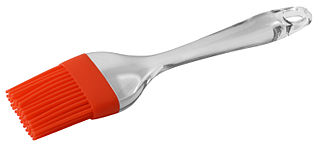Character(s) may refer to:

A fried egg is a cooked dish made from one or more eggs which are removed from their shells and placed into a frying pan and fried with minimal accompaniment. Fried eggs are traditionally eaten for breakfast in many countries but may also be served at other times of the day.

Rotisserie, also known as spit-roasting, is a style of roasting where meat is skewered on a spit – a long solid rod used to hold food while it is being cooked over a fire in a fireplace or over a campfire, or roasted in an oven. This method is generally used for cooking large joints of meat or entire animals, such as pigs or turkeys. The rotation cooks the meat evenly in its own juices and allows easy access for continuous basting.

The Basters are a Southern African ethnic group descended from White European men and Black African women, usually of Khoisan origin, but occasionally also enslaved women from the Cape, who resided in the Dutch Cape Colony in the 18th century. Since the second half of the 19th century, the Rehoboth Baster community has been concentrated in central Namibia, in and around the town of Rehoboth. Basters are closely related to Afrikaners, Cape Coloured and Griqua peoples of South Africa, with whom they share a language and culture.
A spoon is an eating or cooking implement, consisting of a small oval or round shallow bowl with a handle.
A brush is a device with bristles, wire or other filaments used for cleaning, grooming, painting, etc. Brush may also refer to:
Booger or boogers may refer to:
A Dutch oven is a kind of cooking pot.
Fresh or FRESH may refer to:

A pastry brush, also known as a basting brush, is a cooking utensil used to spread butter, oil or glaze on food. Traditional pastry brushes are made with natural bristles or a plastic or nylon fiber similar to a paint brush, while modern kitchen brushes may have silicone bristles. In baking breads and pastries, a pastry brush is used to spread a glaze or egg wash on the crust or surface of the food. In roasting meats, a pastry brush may be used to sop up juices or drippings from under pan and spread them on the surface of the meat to crisp the skin.

Basting is a cooking technique that involves cooking meat with either its own juices or some type of preparation such as a sauce or marinade. The meat is left to cook, then periodically coated with the juice.
Wafer is an English surname, and may refer to
The Basters are an ethnic group in Namibia.
Yvette Basting is a retired tennis player from the Netherlands. During her professional career from 1992–2002, she won seventeen titles on the ITF Women's Circuit and qualified twice for the Australian Open and Wimbledon.
Tonny and Þonny are given names. Tonny is a diminutive Swedish, Danish, Finnish, Dutch, Greenlandic and Norwegian unisex form of the given names Antonia, Antonius, Anton, Antoon, Anthonis, Anthoon as well as a Scandianvian masculine version of the name Toni and pet form of names ending with the element "-ton" that is popular in Finland, Denmark, Sweden, Norway, the Netherlands, Indonesia, South Africa, Namibia, Suriname, Republic of Karelia, Estonia and Greenland. Þonny is a feminine given name that is a form of Torny.
Toon is a Dutch masculine given name that is a diminutive form of Antonie used in Belgium, Netherlands, South Africa, Namibia, Indonesia and Suriname. Notable people with the name include the following:
This page is based on this
Wikipedia article Text is available under the
CC BY-SA 4.0 license; additional terms may apply.
Images, videos and audio are available under their respective licenses.



